Webinars
Upcoming Webinars
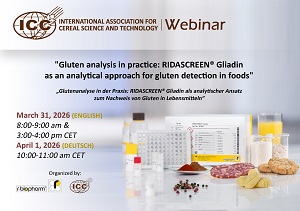
Gluten analysis in practice: RIDASCREEN® Gliadin as an analytical approach for gluten detection in foods
31 March 2026, 08:00 - 09:00 AM & 03:00 - 04:00 PM (CEST) - ENGLISH, and
Glutentenanalyse in der Praxis: RIDASCREEN® Gliadin als analytischer Ansatz zum Nachweis von Gluten in Lebensmitteln
1 April 2026, 10:00 - 11:00 AM (CEST) - GERMAN
This webinar focuses on the ICC Standard 182/1 RIDASCREEN® Gliadin as a general approach for quantitative gluten residue detection in food. Recent advances in the food segments show great importance of including incurred matrices to the validation of new test methods providing more safety for the consumer. However, extensive validation of the standard reveal its’ wide applicability to foods in general including unprocessed and processed food. Questions that will be discussed during the webinar:
- What are the recent advances in gluten detection methods?
- What are incurred matrices and what are their advantages?
- How was the standard validated?
- What are the challenges and advances of this standard method?
Presenters: Johanna Meder & Anna-Lisa Gerards, Product Managers Allergens at R-Biopharm AG, Germany
The registration fee is sponsored by R-Biopharm AG.
REGISTER HERE

Create an ICC Webinar with us!
Would you like to share your expertise and interact with the global cereal community? As ICC member you can co-organise webinars - you provide the content, we provide the facilities and promotion!
ICC Webinars are a great way to get closer to your target group! Get in touch with us for your next webinar!
Past Webinars
ICC Members can watch all recordings from past webinars on demand in the ICC Member Area (when logged in). Not sure whether your organisation is an ICC Member or not? Please contact the ICC Headquarters!
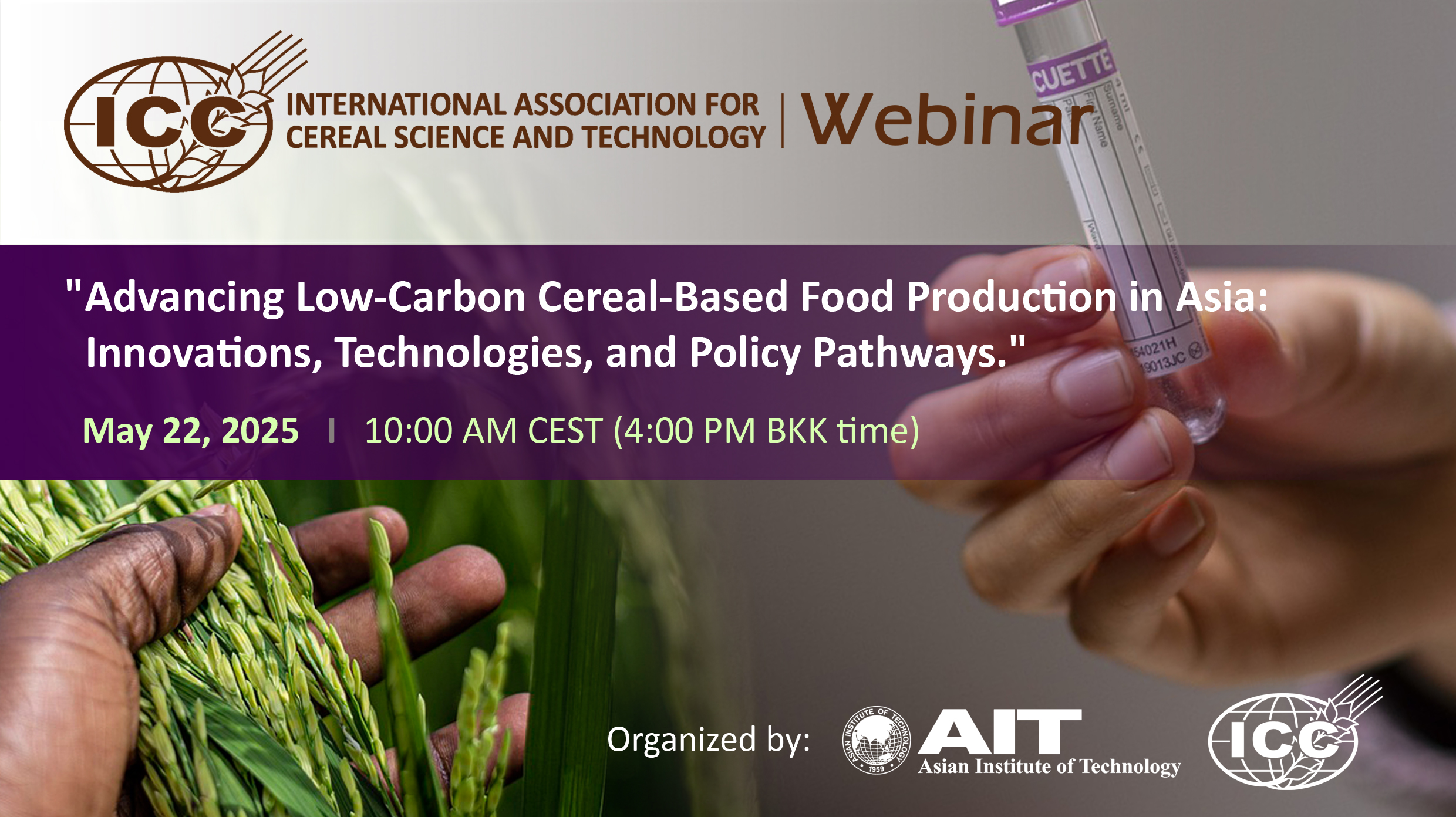
Advancing Low-Carbon Cereal-Based Food Production in Asia: Innovations, Technologies and Policy Pathways
22 May 2024, 10:00 – 11:00 AM CEST (16:00 – 17:00 PM BKK)
This webinar focused on innovative approaches to reduce greenhouse gas (GHG) emissions in cereal-based food production across Asia — from agriculture and processing to packaging. It highlighted how new technologies and smart policy frameworks can support more sustainable food supply chains without compromising food security or economic viability.
The session showcased energy-efficient food processing methods, precision fermentation, smart packaging solutions, and the integration of renewable energy and digital tools in food manufacturing. Practical examples illustrated how innovations along the supply chain can drive decarbonization efforts while maintaining product quality and safety.
The webinar further outlined how collaboration between industry, academia, and policymakers is essential to foster sustainable innovation and support Asia’s growing food demand.
Discussed questions:
- What are the main sources of greenhouse gas emissions in cereal-based food production in Asia?
- Which technologies can help reduce energy consumption and carbon emissions in food processing?
- How can precision fermentation and alternative proteins contribute to more sustainable food systems?
- What role does smart packaging play in minimizing waste and emissions?
- How can policy instruments and industry incentives accelerate the adoption of low-carbon technologies?
Presenter: Professor Anil Kumar Anal
Chair of Food Innovation, Nutrition, and Health
Asian Institute of Technology (AIT), Thailand
Watch the recording HERE (login required).
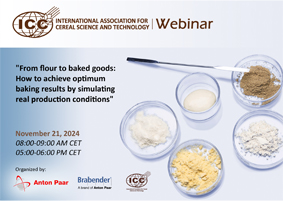
From flour to baked goods: How to achieve optimum baking results by simulating real production conditions
21/11/2024, 08:00-09:00 AM CET & 17:00 - 18:00 PM CET
This webinar highlighted how precise flour and dough analysis directly leads to consistent product quality, which is essential for maintaining costumer trust and meeting industry standards. It emphasized the importance of continuous monitoring of grain and flour quality across the entire supply chain, from cereal breeding to ready-to-eat food product manufacturing helps prevent product failures, ensuring that end products consistently meet consumer expectations. The session focused on in-depth analysis methods which, cimpared to less dtailed rapid methods, offered superior insights that drive informed decision-making and ultimately enhance product quality. Modern laboratory instruments were shown which accurately simulate baking processes, provieding realistic predictions of production outcomes and enabling manufacturers to optimize their processes.
The webinar finally highlighted the evolution of traditional quality control technologies into advanced, automated systems now delivers greater precision and efficiency, making it easier for customers to achieve reliable results, improve production consistency, and innovate in product development.
Discussed questions:
- What is important to ensure constant product quality along the grain and flour supply chain to measure grain and flour quality characteristics?
- What is the benefit of in-depth analysis methds in contrast to rapid methods for flour and dough quality control?
- How can the baking process be simulated realistically to ensure optimum product outcomes in the production process?
- How have traditional technologies of flour quality control evolves during the last years?
- What benefits do state-of-the-art flour quality control instruments provide to users involved in quality control and research?
Presenter: Markus Löns, Product Manager Food at Anton Paar TorqueTec GmbH, Duisburg, Germany
The registration fee was sponsored by Anton Paar.
Watch the recording HERE (log in required).
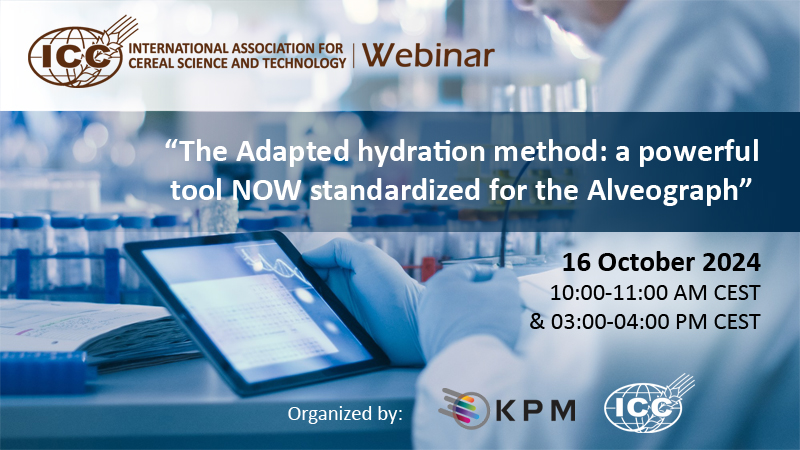
The Adapted hydration method: a powerful tool NOW standardized for the Alveograph
16/10/2024, 10:00-11:00 AM CEST & 03:00 - 04:00 PM CEST (ENGLISH) and
30/10/2024, 04:00 - 05:00 PM CET (SPANISH)
The Alveograph has been used for a century for its capacity to analyze rheological properties of the dough such as tenacity or elasticity. Whilst proving very effective to analyze all types of wheat flours, this method requires to make a dough at constant hydration which may under-hydrate the flours presenting high absorption capacities. A method at adapted hydration has been developed to simulate baking conditions more accurately and has now been officially standardized under ICC 188. This provides a recognized framework for its implementation and ensures that the method delivers precise and accurate results. This presentation aims to explain the method as described in ICC 188 as well as the results obtained, the benefits, and limitations of the method, ultimately helping professionals make informed decisions about the flour quality.
Presenter: Lena Bosc-Bierne, Food, Applications and Products Manager at CHOPIN Technologies/KPM Analytics.
The webinar was held in English and Spanish.
The registration fee was sponsored by KPM Analytics.
Watch the recording HERE (log in required).
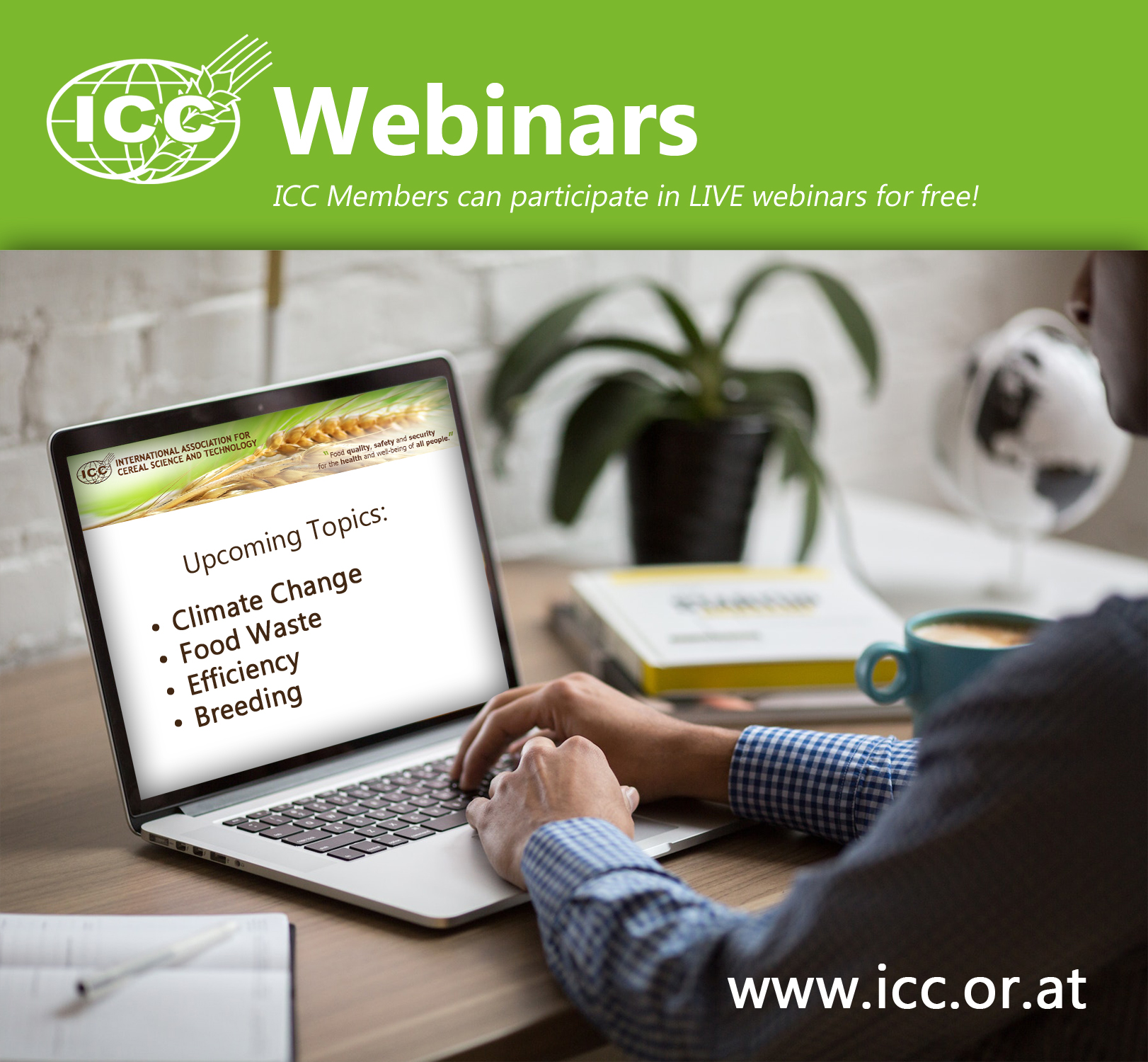
1st ICC Sustainability Webinar
16/01/2024, 02:00 - 03:00 PM CET
ICC cordially invited participants to join a new lecture series where experts explored vital topics related to cereals and sustainability in a relaxed format. The aim was to provide insights into the modern challenges along the cereals' value chain and offer a concise understanding of various issues through short, informative lectures. The lecture series was structured so that each session covered two distinct aspects within the field of cereals.
At that time, the challenges within the cereal value chain were diverse and ranged from the confines of adaptation to climate change and food loss prevention to issues concerning the assessment of raw materials and their derived products. The goal of the series was to offer ideas and suggestions to address these challenges.
The debut session of the new webinar series focused on the prevention of food losses during food production and the sustainable cultivation of baking wheat with reduced nitrogen usage. While the reduced input of nitrogen with the same baking quality of the wheat saved both the farmer's wallet and the environment, the avoidance of food waste during production saved resources and costs. These were both pressing issues central to the sustainability of the grain value chain.
This webinar was held in the English language.
Speakers:
Prof. Dr. Nadina Müller
Head of the Research Group Food Technology, ZHAW Life Sciences and Facility Management – Wädenswil, Switzerland
"Lossless Food Processing - Potential and Pitfalls"
Dr. Alexandra Hüsken
Max-Rubner-Institut (MRI), Department of Safety and Quality of Cereals – Detmold, Germany
"Sustainable Baking Wheat: Balancing Aspiration with Reality"
Fees: 50€* (free for ICC members)
Watch the recording HERE (log in required).
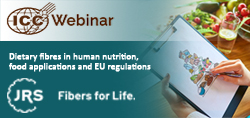
Dietary fibres in human nutrition food applications and EU regulations
12/05/2022, 2:00 - 3:30 PM CEST
The nutritional benefit of extracted fibres as valuable and legal food ingredient has been developed and established in the last 20 years (Stephen, 2017). As nutritive support and completion to intrinsic fibers, like whole grain or bran, fibre concentrates are capable to reduce the existing fiber gap in human nutrition (Miller Jones, 2012).
From the early 1990 JRS, a traditional milling company, developed dietary fibre concentrates based on cereals, vegetables and fruits. With clinical studies and other investigations (fibre enrichment, energy reduction, improvement of insulin sensitivity, maintenance of normal defection, colon fermentation) their nutritive impact on human physiology has been documented in a comprehensive scientific way. This feasible concept for a sustainable fibre addition in a broad range of food categories allows the food industry to face the growing numbers of NCDs. With high quality fibre enriched and/or energy reduced convenience products known for their high acceptance in the market, this conceptual approach for a higher fibre consumption could be made available to a broader group of consumers (Enable, 2015-2018).
Presenters:
Annegret Bögner (JRS): "Scientific evidence promises efficacy of a more comprehensive approach to increase dietary fiber intake"
Richard Lau (JRS): "Fiber in different food applications"
Nikolaus Klein (JRS Austria): "J. Rettenmaier & Söhne – A Dietary Fiber Producer"
Jürgen Sieg (JRS): "EU Regulations to evaluate dietary fibers"
Alfred Mar (ICC Austria) was moderator of this webinar.
The registration fee has been sponsored by J. Rettenmaier & Söhne.
Click HERE to watch the recording of the live webinar on demand (login necessary).
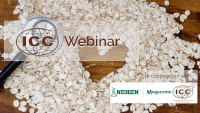
Cereal beta-glucan: the good, the bad and the viscous - Health Claims, Regulatory Landscape & Analytical Methodology
10/11/2021
Cereal beta-Glucan is one of the main polysaccharide constituents of cereals, especially barley and oats. While these cereals have been staple food for animal nutrition, they are increasingly becoming popular and widespread as food. The consumption of these beta-glucan rich cereals is linked to their recognised health benefits on our cardiovascular system. Health benefits and the associated labelling claims, allowed to food manufacturers are linked to the accurate measurement of beta-glucan content. The analytical methodology required to accurately measure beta–glucan in its entirety, allowing for compliant health claims will be discussed together with other available methods.
Dave Plank, Managing Principal of WRSS Food & Nutrition Insights and a Senior Research Fellow at the Dept. of Food Science and Nutrition at the University of Minnesota, will present on Health benefits, Labeling claims, and Regulatory Landscape for Beta-Glucans.
Claudio Cornaggia, Product Manager at NEOGEN, will present on the structure, relevancy and methods of analysis of Cereal beta-glucan.
Click HERE to watch the recording of the live webinar on demand (login necessary).
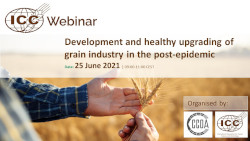
Development and healthy upgrading of grain industry in the post-epidemic era
25/06/2021
In order to promote the development and healthy upgrading of the food industry in the post epidemic era, CCOA and ICC invited three experts in the industry to discuss the three topics
Xinzhong Hu from Shaanxi Normal University will introduce Processing technology innovation and Glycemic Index evaluation of Coarse Cereals.
Jian Xie from China Grain Wuhan Scientific Research & Design Institute will describe Healthy development of rice industry in China in the post epidemic Era
Yuanrong Jiang of Wilmar Global R&D Center will discuss Upgrading and innovation of plant protein industry.
This webinar will be held in English!
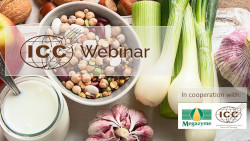
Fructan: Functional food ingredient here or food intolerance villain? Exploring physiological effects and suitable analytical methods
14/04/2021
Fructan is the term used to describe oligomeric or polymeric chains containing primarily fructose monomers. Fructan received much attention at the beginning of this century as our knowledge on dietary fiber expanded and the CODEX definition came to encapsulate low-molecular weight fibres including fructan and FOS. These compounds occur naturally in certain foods and a number of food manufacturers have developed fructan based functional food ingredients, promoting their prebiotic potential as dietary fibres. Interestingly however, fructan has recently been implicated as the potential root cause of typical IBS symptoms in individuals that claim to suffer with gluten intolerance. In addition to exploring these contrasting effects, the analytical methodology required to accurately quantify the various types of fructan will be discussed. The analytical challenges and required solutions will be described in some detail.
Prof. Jane Muir, Head of Translational Nutrition Science at Monash University in Melbourne, will introduce a new family of short chain carbohydrates called FODMAPs.
Dr. David Mangan, Research Director at Megazyme, will describe known fructan chemical structures and present a mini-review of the instrument-based analytical methodology available for the analysis of fructan.
Prof. Barry McCleary, Strategic Advisor of Megazyme, developed two of the AOAC approved methods for fructan determination (999.03 and 2018.07) and will discuss these in some detail.
This webinar will be held in English!
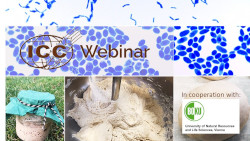
SOURDOUGH: A TOOL TO IMPROVE FLAVOUR; SUSTAINABILITY; AND DIGESTIBILITY
21/04/2021
Sourdough technology has been used for centuries in breadmaking. Nowadays the interest of consumers regarding sourdough products is again growing due to its beneficial properties.
Lactic acid bacteria and yeasts that are naturally present in sourdough contribute to improved sensory attributes and enhanced shelf-life. Due to the elongated storage of fermented products an important contribution to sustainability can be made. Further, an increased number of people is suffering from wheat hypersensitivity reactions. But, sourdough processing was proven to be an effective tool to reduce wheat components that are known to elicit adverse reactions when consuming wheat and other cereals.
By identifying strains of yeasts and lactic acid bacteria and characterizing their metabolisms, specific sourdough cultures might be selected in order to address individual health conditions and needs.
Vera Fraberger from BOKU will cover "Sustainability improvement by sourdough processing" while
Lisa Call from BOKU will present "Sourdough as a tool to improve digestibility"
Click HERE to watch the recording of the live webinar on demand (login necessary).
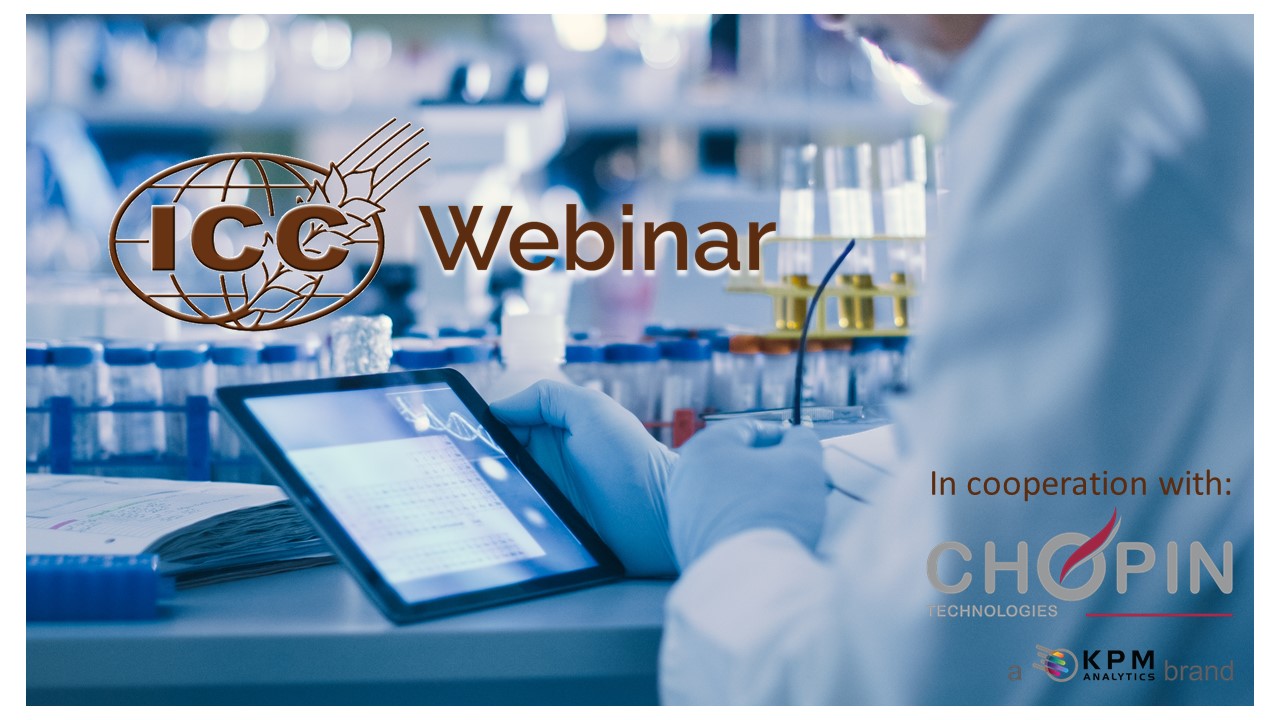
Simple Approach of ICC Standards: from collaborative study to routine use - Part 2
02/02/2021
Standard methods are an essential part of a laboratory proper functioning and are essential for anyone wishing to agree on accepting a good or fixing a price based on laboratory analysis. But what does "standard" really mean?
ICC Standards describe the operating mode of an analytical method and/or provide quantified data that makes it possible to know the performances achievable by the method when the protocol is respected.
Where do the data in the ICC Standards come from? What do they mean in regard of the precision of the method? Most importantly: How to use them to insure a proper communication, but internally and externally?
Lena BOSC-BIERNE, Products and Application Specialist at CHOPIN Technologies, explained in this 2. part of the two-stage webinar, within the scope of the ICC Draft Standard No. 188 – Determination of Alveolab properties of dough at adapted hydration from commercial or test flours, how to ensure a proper communication with its partners based on the standard data.
This webinar was held in English and Spanish!
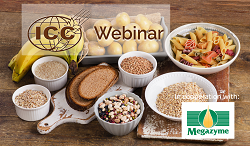
Resistant Starch: Physiological effects, health benefits and accurate measurement
26/01/2021
Resistant starch (RS) is that component of starch which is resistant to digestion in the human small intestine.
Since being originally described by Englyst in 1982, this topic has attracted major interest from those in academia and industry. Throughout this time, the primary research goals were to understand the mechanisms of how RS exerts its well documented benefits to human health and to accurately determine the RS content within food. This would allow for development of new RS-based functional food ingredients and also provide information on those foods that naturally contain RS with a view to improving the diet of the world’s population. The rapid global increase in such diseases as obesity and type 2 diabetes makes these goals increasingly relevant as time goes on.
This webinar will outline the state of the art in the current understanding of both the analytical methodology and the digestive biology of RS.
Prof. Barry McCleary, CEO and owner of Megazyme presented on "Approaches to the measurement of Resistant Starch" while
Prof. Bruce R. Hamaker, Ph.D. Professor of Food Science at Purdue University, West Lafayette, Indiana talked about "Resistant starch, it's digestive fate, physiological effects and associated health benefits"
This webinar was held in English!

Simple Approach of ICC Standards: from collaborative study to routine use - Part 1
19/01/2021
Standard methods are an essential part of a laboratory proper functioning and are essential for anyone wishing to agree on accepting a good or fixing a price based on laboratory analysis. But what does "standard" really mean?
ICC Standards describe the operating mode of an analytical method and/or provide quantified data that makes it possible to know the performances achievable by the method when the protocol is respected.
Where do the data in the ICC Standards come from? What do they mean in regard of the precision of the method? Most importantly: How to use them to insure a proper communication, but internally and externally?
Lena BOSC-BIERNE, Products and Application Specialist at CHOPIN Technologies, explained in this 1 part of the two-stage webinar, within the scope of the ICC Draft Standard No. 188 – Determination of Alveolab properties of dough at adapted hydration from commercial or test flours, the standardization process and internal use of the fidelity date from the collaborative study to the control chart.
This webinar was held in English and Spanish!
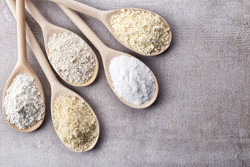
GLUTEN-FREE: FROM A TREND TOWARDS HIGH QUALITY PRODUCTS - Part 2
15/12/2020
Gluten-free food is present everywhere nowadays. Although only a small percentage of buyers of gluten-free products are gluten intolerant or gluten sensitive, the market grows about 25% per year.
What's the background of this nutritional trend? And how to make a good and tasty bread without gluten? What about the analytical methods to measure flour quality of e.g. wheat - can they also be used for rice, corn and chickpea flour?
Speakers in this 2-stage webinar have been:
- Aylin Sahin, University College Cork, Ireland
- Stefan Jansen, Brabender, Germany
- Jessica Wiertz, Brabender, Germany
Click HERE to watch the recording of the live webinar on demand (login necessary).

International Whole Grain Day: Building Healthy, Sustainable and Resilient Food Systems
19/11/2020
Join the WGI, the FAO, and a host of global leaders to discuss how the daily consumption of whole grains is a vital part of not only healthy, but also sustainable diets.
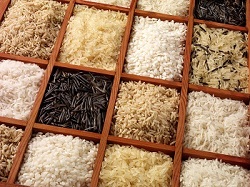
A new protocol for RICE VARIETY IDENTIFICATION
20/10/2020
Dr. Kae-kang HWU, from the Department of Agronomy at the National Taiwan University, established a protocol for rice variety identification with a novel set of 12 simple sequence repeats (SSR) markers, which has been tested by two stages of international ring trials. This identification method has been applied for an ICC Standard and is introduced during this webinar.
This webinar consists of:
- 5 self-study tutorials providing recorded presentations and videos
- A live discussion sessions to discuss all Questions & Answers
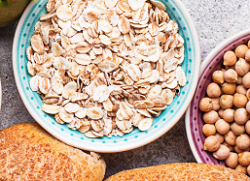
DIETARY FIBER MEASUREMENT HAS CHANGED - what does this mean for you?
13/10/2020
In this webinar Prof. Barry McCleary, CEO and owner of Megazyme and method's author:
- Highlights what has changed and why
- Provides guidance on how to select the correct method for a particular food sample (incl. RS2 or RS3)
- Focuses on the impact this change in DF measurement will have on regulatory compliance by examining the US as a case study
- Outlines in detail the essentials of the analytical documentation needed to support compliant dietary fiber labelling for Nutrition Facts Disclosures in the US

